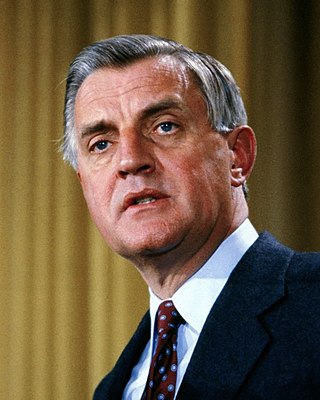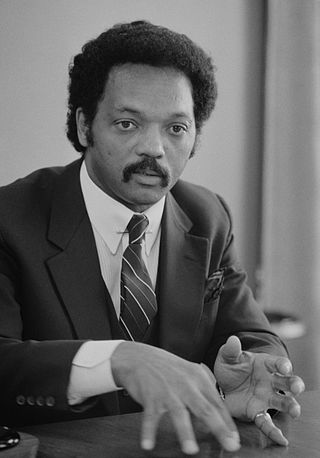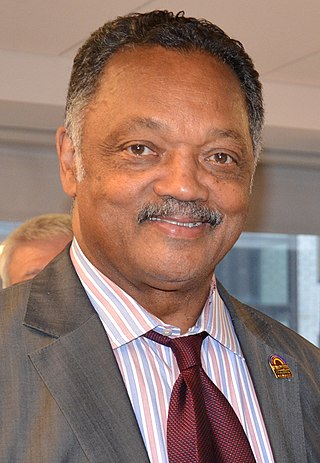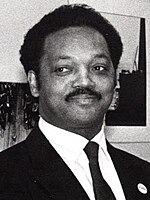
The 1988 United States presidential election was the 51st quadrennial presidential election held on Tuesday, November 8, 1988. Incumbent Republican Vice President George H. W. Bush defeated the Democratic Massachusetts Governor Michael Dukakis.

The 1984 United States presidential election was the 50th quadrennial presidential election held on Tuesday, November 6, 1984. Incumbent Republican president Ronald Reagan was re-elected to a second term defeating Democratic former vice president Walter Mondale in a landslide victory.

Michael Stanley Dukakis is an American retired lawyer and politician who served as governor of Massachusetts from 1975 to 1979 and again from 1983 to 1991. He is the longest-serving governor in Massachusetts history and only the second Greek-American governor in U.S. history, after Spiro Agnew. He was nominated by the Democratic Party for president in the 1988 election, losing to the Republican nominee, Vice President George H. W. Bush.

Jesse Louis Jackson Jr. is an American politician. He served as the U.S. representative from Illinois's 2nd congressional district from 1995 until his resignation in 2012. A member of the Democratic Party, he is the son of activist and former presidential candidate Jesse Jackson and, prior to his career in elected office, worked for his father in both the elder Jackson's 1984 presidential campaign and his social justice, civil rights and political activism organization, Operation PUSH. Jackson's wife, Sandi Jackson, served on the Chicago City Council. He served as a national co-chairman of the 2008 Barack Obama presidential campaign. Jackson established a consistent liberal record on both social and fiscal issues, and he has co-authored books on civil rights and personal finance.

Super Tuesday is the United States presidential primary election day in February or March when the greatest number of U.S. states hold primary elections and caucuses. Approximately one-third of all delegates to the presidential nominating conventions can be won on Super Tuesday, more than on any other day. The results on Super Tuesday are therefore a strong indicator of the likely eventual presidential nominee of each political party.

From February 10 to June 9, 1992, voters of the Democratic Party chose its nominee for president in the 1992 United States presidential election. Arkansas Governor Bill Clinton won the nomination through a series of primary elections and caucuses culminating in the 1992 Democratic National Convention held from July 13 to July 16, 1992, in New York City.

The 1992 presidential campaign of Bill Clinton, the then-governor of Arkansas, was announced on October 3, 1991, at the Old State House in Little Rock, Arkansas. After winning a majority of delegates in the Democratic primaries of 1992, the campaign announced that then-junior U.S. senator from Tennessee, Al Gore, would be Clinton's running mate. The Clinton–Gore ticket defeated Republican incumbent President George H. W. Bush and Vice President Dan Quayle in the presidential election on November 3, 1992, and took office as the 42nd president and 45th vice president, respectively, on January 20, 1993.

The 1988 presidential campaign of Al Gore, U.S. Senator of Tennessee and former House Representative began on April 11, 1987. He campaigned for President of the United States as a Democratic candidate in the 1988 presidential election, against Democratic candidates Joe Biden, Dick Gephardt, Paul Simon, Jesse Jackson, and Michael Dukakis. Despite eventual defeat, Gore, who came in a third place, was one of the front-runners that year. Al Gore, at that time, represented the Southern Democrats and some of the Conservative Democrats in 1980s.

From February 20 to June 12, 1984, voters of the Democratic Party chose its nominee for president in the 1984 United States presidential election. Former Vice President Walter Mondale was selected as the nominee through a series of primary elections and caucuses culminating in the 1984 Democratic National Convention held from July 16 to July 19, 1984, in San Francisco, California.

From February 8 to June 14, 1988, voters of the Democratic Party chose its nominee for president in the 1988 United States presidential election.

From January 24 to June 6, 2000, voters of the Democratic Party chose its nominee for president in the 2000 United States presidential election. Incumbent Vice President Al Gore was selected as the nominee through a series of primary elections and caucuses culminating in the 2000 Democratic National Convention held from August 14 to 17, 2000, in Los Angeles, California, but he went on to lose the Electoral College in the general election against Governor George W. Bush held on November 7 of that year, despite winning the popular vote by 0.5%.

In 1984, Jesse Jackson became the second African American to mount a nationwide campaign for President of the United States, running as a Democrat.

Jesse Louis Jackson is an American civil rights activist, politician, and ordained Baptist minister. Beginning as a young protégé of Martin Luther King Jr. during the civil rights movement, Jackson maintained his status as a prominent civil rights leader throughout his political and theological career for over seven decades. He served from 1991 to 1997 as a shadow delegate and senator for the District of Columbia. Jackson is the father of former U.S. Representative Jesse Jackson Jr. and current U.S. Representative Jonathan Jackson.

African-American candidates for president of the United States from major parties include U.S. Senator Barack Obama (D-IL), elected president of the United States in 2008. He was the first African American to win a presidential election and the first African American to serve as president of the United States. He was re-elected as president in 2012. There had been several candidates in the years before.

The 1988 United States presidential election in Louisiana took place on November 8, 1988, as part of the 1988 United States presidential election. State voters chose ten representatives, or electors to the Electoral College, who voted for president and vice president.

The 1988 United States elections were held on November 8 and elected the President of the United States and members of the 101st United States Congress. Republican Vice President George H. W. Bush defeated Democratic Governor of Massachusetts Michael Dukakis. Despite Dukakis' defeat, the Democratic Party built on their majorities in Congress.

The 1988 United States presidential election in Arkansas took place on November 8, 1988. All fifty states and the District of Columbia, were part of the 1988 United States presidential election. State voters chose six electors to the Electoral College, which selected the president and vice president.

The 1988 presidential campaign of George H. W. Bush, the 43rd vice president of the United States under President Ronald Reagan, began when he announced he was running for the Republican Party's nomination in the 1988 U.S. presidential election on October 13, 1987. Bush won the 1988 election against Democratic nominee Michael Dukakis on November 8, 1988. He was subsequently inaugurated as president on January 20, 1989.

The 1988 presidential campaign of Michael Dukakis began when he announced his candidacy for the Democratic Party's nomination for President of the United States on March 16, 1987, in a speech in Boston. After winning the nomination, he was formally selected as the Democratic Party's nominee at the party's convention in Atlanta, Georgia on July 21, 1988. He lost the 1988 election to his Republican opponent George H. W. Bush, who was the sitting Vice President at the time. Dukakis won 10 states and the District of Columbia, receiving a total of 111 electoral votes compared to Bush's 426. Dukakis received 45% of the popular vote to Bush's 53%. Many commentators blamed Dukakis' loss on the embarrassing photograph of him in a tank taken on September 13, 1988, which subsequently formed the basis of a successful Republican attack ad. Much of the blame was also laid on Dukakis' campaign, which was criticized for being poorly managed despite being well funded. Had Dukakis been elected, he would have been the first Greek American president, the first non-Western European American president, and the second governor of Massachusetts to accomplish this feat, after Calvin Coolidge. Bentsen would have been the second senator from Texas to be elected vice president, after Lyndon B. Johnson.



















